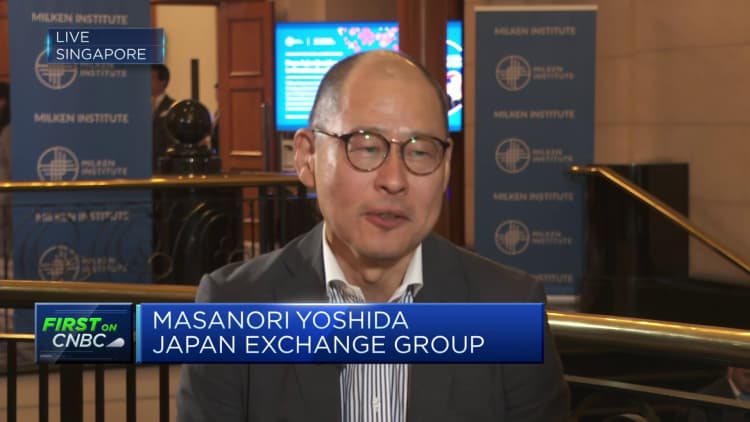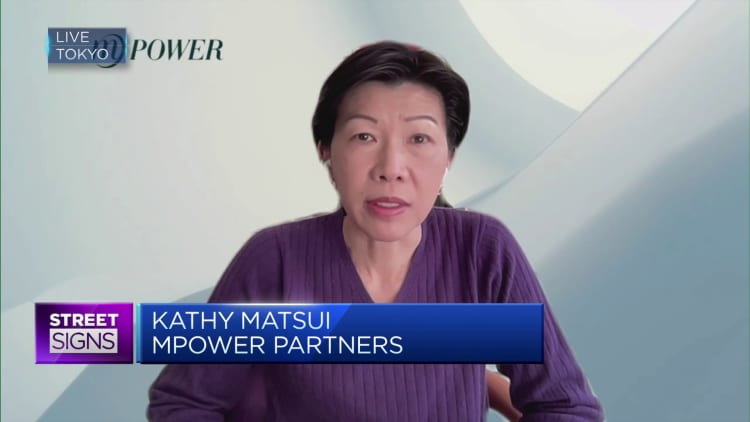[ad_1]
Flag of Japan on darkish blue background. 3D render
Da-kuk | E+ | Getty Photographs
Japan is stepping up efforts to make sure its listed corporations develop into extra environment friendly with capital allocation and improve shareholder returns this yr.
The operator of Tokyo’s inventory change will launch Monday, its first month-to-month record of public corporations which have shared their plans for optimizing capital administration to boost returns for his or her traders.
The Japanese authorities and the TSE even have plans within the works for growing company board independence and feminine illustration.
“It is not simply the Tokyo inventory change, however your complete Japan authorities is pushing for higher company governance proper now,” stated Toru Yoshikawa, a enterprise professor at Waseda College in Tokyo.
The Tokyo Inventory Trade is getting into into its second yr of company governance reforms, kickstarted in March final yr, by directing listed corporations whose shares are buying and selling under a price-to-book ratio of 1 — a sign it is probably not utilizing its capital effectively — to “comply or clarify.”
That is only one a part of Prime Minister Fumio Kishida’s broader pledge to remodel Japan Inc into a lovely funding proposition for foreigners and Japanese traders.
In a daring transfer geared toward encouraging its residents to redirect their financial savings in the direction of funding, Japan overhauled its Nippon Particular person Financial savings Account (NISA) to make all investments underneath this program tax exempt for the lifetime of the investor efficient this month.

With this transfer, the onus additionally falls on Japan’s authorities to make sure regular and dependable returns from Japan’s corporations.
These measures even have implications for Japan’s broader financial agenda corresponding to corporations’ wage-setting habits and the trouble to reflate the world’s third-largest economic system, which has been mired in deflation for a lot of the final three many years.
With a quickly ageing inhabitants, the nation can be eager on its listed corporations providing enticing shareholder returns to make sure its folks have extra to reside on than simply their common pensions of their retirement.
“It is a very essential challenge sooner or later for Japan. Many individuals would not have sufficient earnings to reside after retirement,” Yoshikawa stated. “The federal government additionally desires to draw extra international funding to create extra greater expert jobs.”
The prospect of significant change has revived curiosity within the Japanese shares up to now yr, with the benchmark Nikkei 225 index hovering to its highest in additional than three many years — with many international traders taking the lead of legendary investor Warren Buffet and his bullish calls on Japanese equities.
Company governance push
Monday’s disclosures shall be based mostly on data as of December and the releases shall be a month-to-month affair.
At its final replace in October, the Tokyo Inventory Trade stated solely 31% of 1,235 “prime” listings — essentially the most liquid shares with the most important market capitalization — and a mere 14% of 887 “commonplace” listings have responded to its request for reporting their discussions on, and particular measures and timelines for enhancing the way in which they handle their capital.
“Delisting or any punishment or any enforcement is sort of unlikely, however the excellent news in Japan is there’s the peer stress issue,” Yunosuke Ikeda, Nomura’s chief fairness strategist, advised CNBC in June. “If rival corporations are doing nice enhancements in company governance, others will are inclined to observe that transfer.”

The world’s largest carmaker Toyota Motor is one instance.
Together with two different affiliated corporations, it introduced in late November it might trim its stake in automobile components maker Denso to fund extra funding in electrical automobiles. Toyota additionally introduced in late July it’ll scale back its stake in telecommunications operator KDDI.
“Our expectation is that continued TSE stress on corporates to reply to its requests will result in an additional acceleration in company governance-related exercise amongst listed Japanese corporations in 2024,” Goldman Sachs Japan fairness strategists stated of their 2024 outlook.
“Specifically, we consider that traders view firm bulletins relating to the unwinding of cross-shareholdings as an essential indication of company governance enchancment, and as share costs usually react strongly consequently, we expect this theme warrants continued consideration in 2024,” they added.
Board modifications
There are different strikes geared toward serving to Japan Inc inject extra range and independence to their boards, whereas getting Japanese corporations to develop into extra attentive to shareholders.
As a part of the foundations Japan’s authorities plans to incorporate in itemizing laws, the most important listed corporations are required to have not less than one lady on their respective boards by 2025.
By 2030, Japan goals to have girls represent not less than 30% of the administrators at main corporations, based on draft plans launched by Japan’s Gender Equality Bureau in June which are broadly geared toward growing and empowering feminine participation within the economic system.

In its 2021 revision, the nation’s Company Governance Code, Japan’s Monetary Companies Company mandated for not less than a 3rd of the board of listed corporations to be unbiased administrators from exterior their respective corporations.
“We expect it’s no coincidence that there was a wave of sweeping capital reshuffling this yr,” Financial institution of America Securities’ Japan fairness strategists stated in a word final month.
“Stronger disciplinary measure is being taken in opposition to corporations, and there are indications that, for corporations, the which means of being listed is beginning to change,” they wrote.
[ad_2]
Source link







